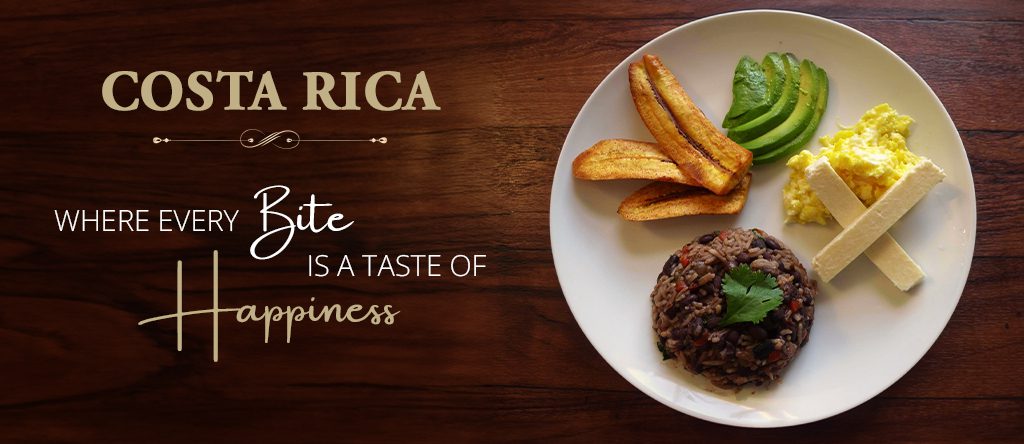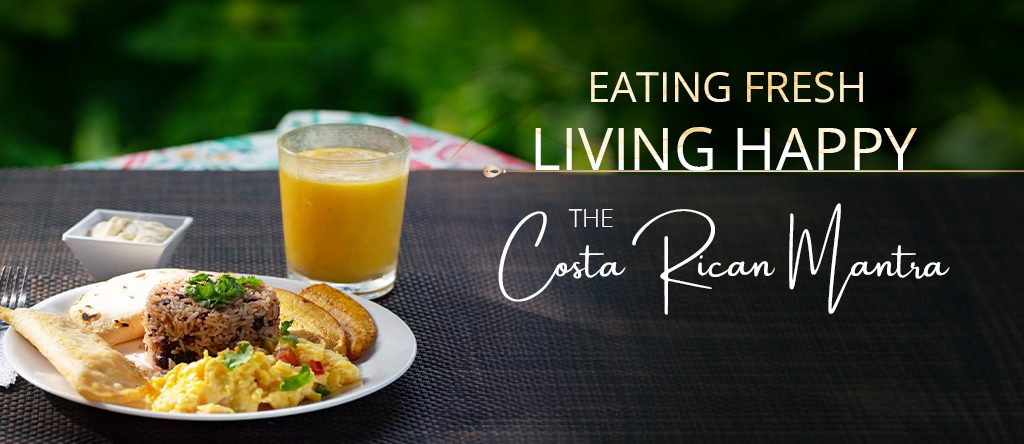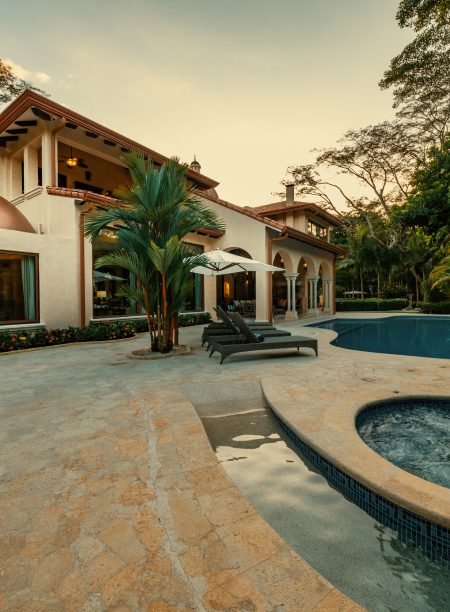Nestled between the azure waves of the Pacific and the lush rainforests of Central America, Costa Rica is more than just a travel paradise. It’s a land of joy, ranking impressively in the World Happiness Report year after year. But what’s the secret behind those beaming smiles and contented hearts?
Beyond its stunning landscapes and spirited local dances, there’s the emblematic “Pura Vida” lifestyle. This phrase translates to “pure life,” and encapsulates the nation’s ethos: living in harmony, cherishing simple joys, and emphasizing happiness and well-being.
But here’s a flavorful twist: Could the traditional Costa Rican diet be a hidden ingredient in their recipe for happiness? Dive in as we explore the delicious connection between what the Ticos eat and how they feel!
1. Balanced Macronutrients:
The classic pairing of rice and beans in tropical cuisine epitomizes nutritional harmony. Combined, they form a complete meal, essential for repairing and building body tissues. Carbohydrates from rice fuel the body’s daily activities, while proteins from beans ensure muscle growth and repair.
This balance isn’t just about physical wellness; it directly affects mental health. Stable energy levels from such meals can prevent blood sugar fluctuations, often linked to mood swings and irritability. Basically, this balance is why Costa Rica is one of the happiest countries in the world!

2. Abundance of Fresh Fruits and Vegetables:
Costa Rica is a cornucopia of fruits and vegetables and a powerhouse of essential nutrients. For instance, tropical fruits like papaya and guava are rich in vitamin C, which aids in collagen production and boosts the immune system. Moreover, these colorful edibles are rich in antioxidants that fight off free radicals, reducing the risk of chronic diseases. When the body is free from ailments and the immune system is robust, the body has an inherent sense of well-being that contributes to overall happiness.
3. Emphasis on Organic and Non-Processed Foods:
Opting for organic foods means reducing the intake of pesticides and chemicals often associated with conventional agriculture. Consuming cleaner foods reduces the toxic load on the body, promoting better organ function and decreasing inflammation.
Chronic inflammation has been linked to various mood disorders, including depression. Ticos inadvertently support their physical and mental health by choosing non-processed and organic foods.
4. Omega-3 from Fresh Fish:
The coastal bounty of this Central American country is rich in fatty fish like mackerel, sardines, and tuna. These fish are a potent source of Omega-3 fatty acids, renowned for their positive impact on brain health.
DHA, a type of Omega-3 fatty acid, is a major structural component of the brain and retina. Regular fish consumption can enhance cognitive functions, reduce the risk of Alzheimer’s, and even combat depressive disorders. There’s a direct link between a fish-based diet and a sharp, happy mind.
5. Fermented Foods and Gut Health:
The gut-brain axis is a buzzing area of research, revealing the intricate connections between our digestive system and brain health. Fermented foods, like “Chilero,” introduce beneficial bacteria into the gut, promoting a balanced microbiome.
Chileros are a delicious addition to Costa Rican cuisine, available in various flavors and forms. Some are as simple as a mixture of lime juice with chopped peppers and onions, while others are more complex and incorporate a variety of vegetables and herbs.
A healthy gut can synthesize a significant portion of the body’s serotonin, a neurotransmitter regulating mood, appetite, and sleep. With fermented foods as dietary staples, Costa Ricans care for their gut and nurture their mental well-being.

6. Consistent Hydration with Natural Beverages:
Staying hydrated is a necessity and a delightful indulgence in tropical climate. With abundant access to natural beverages such as freshly brewed Costa Rican coffee, coconut water, herbal teas, and freshly squeezed fruit juices, Ticos regularly replenish their bodies.
Adequate hydration plays a pivotal role in maintaining cognitive function and mood equilibrium. Even mild dehydration can impair attention, long-term memory, and mood. By consistently sipping these natural drinks, their minds remain as refreshed as their palate.
7. Communal Eating Encourages Social Bonds:
For Costa Ricans, mealtime transcends mere nourishment; it’s a ritual of togetherness. The tradition of gathering around a table and sharing a meal with loved ones strengthens social bonds.
Research consistently shows that social connections and meaningful interactions enhance happiness and well-being. By emphasizing communal eating, Ticos, especially Nicoyans—natives from the Nicoya Peninsula, nourish their bodies and nurture their souls, fostering a culture of shared joy and contentment.
8. Mindfulness and Appreciation of Food:
Eating can sometimes become mindless in the hustle and bustle of modern life. Not so in Costa Rica, where there’s a cultural emphasis on being wholly present during meals.
Mindful eating—taking the time to savor each bite, appreciate the flavors, and truly enjoy the meal—has been linked to improved digestion, reduced overeating, and an enhanced sense of satisfaction. By relishing every meal with their entire presence, locals weave moments of joy into every dining experience.
9. Sustainability and Environmental Consciousness:
One of the understated contributors to happiness is the contentment derived from knowing that one’s actions—and, in this context, dietary choices—are in harmony with the environment. Ticos, as a country, are a beacon of sustainable farming and fishing practices, ensuring their rich culinary traditions tread lightly on Mother Earth. The happiness that emanates from a conscious, eco-friendly diet is twofold: the joy of delicious food and the peace of knowing it aligns with environmental well-being.
Read more about how Costa Rica promotes sustainable, regenerative, and eco-friendly tourism.
10. Foods Rich in Tryptophan:
The lush landscapes here produce a variety of foods, including those rich in tryptophan, an amino acid instrumental in serotonin production. For instance, bananas, commonly enjoyed in various tropical dishes, are a natural source of tryptophan. Serotonin, often known as the “feel-good” neurotransmitter, plays a significant role in mood regulation, sleep patterns, and overall well-being.
Thus, by including tryptophan-rich foods in their diet, people have another delightful avenue to elevate their spirits.
Together, these facets offer a comprehensive look into the deep connections between the Costa Rica diet, health, and happiness. Whether through the nutrients they consume or the traditions they uphold, every Tico meal is a step towards a more joyful existence.
Let Villa Firenze Serve You the Best Tropical Diet:
Nestled amidst the serene landscapes of Costa Rica is Villa Firenze, an epitome of luxury and comfort. With various luxury amenities tailored to offer guests an unparalleled vacation experience, our villa in Costa Rica stands out for its commitment to gastronomy. The heart and soul of this commitment is Chef Pablo, the villa’s private chef, who ensures every meal is an event to remember.
Chef Pablo Turel, the culinary maestro at Villa Firenze, infuses every dish with passion and expertise. But what truly sets these meals apart is his farm-to-table philosophy. By sourcing fresh, local, and sustainable ingredients, Chef Pablo ensures that each plate not only delights the palate but also nourishes the body. Every bite served here is a testament to the country’s rich dietary traditions, offering guests a taste of tropical wellness.

Conclusion:
As we’ve journeyed through the Costa Rican culinary landscape, it’s evident that the nation’s diet is a harmonious blend of taste, nutrition, and culture. Every aspect of the Costa Rican diet seems tailored for happiness and health, from the balanced macronutrients found in their staple rice and beans to the mood-enhancing effects of tryptophan-rich foods.
Consider embracing some of these dietary habits in your routine to taste this joyous way of life. After all, happiness, as Costa Rica shows us, often begins on a plate.











